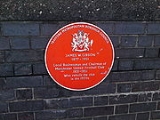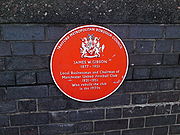
James W. Gibson
Encyclopedia

United Kingdom
The United Kingdom of Great Britain and Northern IrelandIn the United Kingdom and Dependencies, other languages have been officially recognised as legitimate autochthonous languages under the European Charter for Regional or Minority Languages...
businessman who was the owner of the English
England
England is a country that is part of the United Kingdom. It shares land borders with Scotland to the north and Wales to the west; the Irish Sea is to the north west, the Celtic Sea to the south west, with the North Sea to the east and the English Channel to the south separating it from continental...
football club Manchester United
Manchester United F.C.
Manchester United Football Club is an English professional football club, based in Old Trafford, Greater Manchester, that plays in the Premier League. Founded as Newton Heath LYR Football Club in 1878, the club changed its name to Manchester United in 1902 and moved to Old Trafford in 1910.The 1958...
from 1931 until his death in 1951.
Early life
The son of a successful uniform manufacturer, Gibson was born in Salford but brought up in central ManchesterManchester
Manchester is a city and metropolitan borough in Greater Manchester, England. According to the Office for National Statistics, the 2010 mid-year population estimate for Manchester was 498,800. Manchester lies within one of the UK's largest metropolitan areas, the metropolitan county of Greater...
with his younger brother, John, and their sister, Florence, who died at a very early age. Tragedy befell the family again when Gibson was 14, as both his parents contracted fatal illnesses and the children went to live with their paternal grandparents. Unfortunately, the grandparents died soon after, and the children were taken in by their uncle, their mother's only brother, William Fell. Fell was himself a successful businessman, like the boys' father, and had become a famous corn merchant on the outskirts of the city. Gibson began working with Fell in the corn business, immersing himself in all aspects of the company, but excelling in sales.
Into the clothing industry
Just after the turn of the 20th century, after 15 years working for his uncle, Gibson decided to set up his own company. The textiles industry in and around Manchester was booming at the time, so Gibson followed his father into the uniform business, and since his father's name was still fairly well known in the city, he quickly built up a portfolio of contacts. The business grew steadily for several years, before the outbreak of the First World WarWorld War I
World War I , which was predominantly called the World War or the Great War from its occurrence until 1939, and the First World War or World War I thereafter, was a major war centred in Europe that began on 28 July 1914 and lasted until 11 November 1918...
earned Gibson his first major contract; the company began manufacturing uniforms for the British Armed Forces
British Armed Forces
The British Armed Forces are the armed forces of the United Kingdom of Great Britain and Northern Ireland.Also known as Her Majesty's Armed Forces and sometimes legally the Armed Forces of the Crown, the British Armed Forces encompasses three professional uniformed services, the Royal Navy, the...
on a daily basis. This deal forged Gibson's reputation and by the end of the war he had become a well-respected entrepreneur.
However, the end of the war also meant that the company was now selling less uniforms and needed a new source of revenue. Not content with anything small-scale, Gibson approached the city corporations with an offer to provide uniforms for the tram drivers and conductors, selling the idea that they would be proud to wear such a uniform. The idea proved a success, and Gibson was able to diversify into other fields outside clothing. Nevertheless, he continued to concentrate on the uniform business and, in 1924, he entered into a partnership with Messrs F. Jones and R. H. H. Briggs, forming Briggs, Jones and Gibson. They relocated the business to larger premises on Lostock Street, near Oldham Road in Collyhurst
Collyhurst
Collyhurst is a locality in Manchester. It is 1½ miles northeast of Manchester city centre, on Rochdale Road and Oldham Road. The River Irk passes through the area...
, and the combined talents of the three men meant further expansion, both in Manchester and in other cities. However, in 1926, Jones died, putting the business under pressure. For reasons thought to be related to his age, Briggs also decided to sell his share in the business, and Gibson took sole control of the company. Unfortunately, this coincided with the onset of the Great Depression
Great Depression
The Great Depression was a severe worldwide economic depression in the decade preceding World War II. The timing of the Great Depression varied across nations, but in most countries it started in about 1929 and lasted until the late 1930s or early 1940s...
, which meant a massive downturn in trade. Fortunately for Gibson, his interests in other fields meant that the business was able to survive the Depression.
Manchester United
A Salfordian by birth, Gibson was living in Old Trafford in 1911 and was aware of his 'local' football team, although whether he was an active supporter at this time is not known. Unlike Gibson, Manchester United F.C.Manchester United F.C.
Manchester United Football Club is an English professional football club, based in Old Trafford, Greater Manchester, that plays in the Premier League. Founded as Newton Heath LYR Football Club in 1878, the club changed its name to Manchester United in 1902 and moved to Old Trafford in 1910.The 1958...
was being affected greatly by the Great Depression. Their previous owner, John Henry Davies
John Henry Davies
John Henry Davies was a wealthy brewery owner who in 1902 took over the British football club Manchester United, which was then called Newton Heath. The club had massive debt at the time....
had died in 1927 after 25 years at the club. They had won the FA Cup and two league titles during the first 10 years of his chairmanship and by the time of Davies's death they were developing a reputation as a "yo yo" club who regularly moved between the First and Second Divisions.
Gibson injected around £
Pound sterling
The pound sterling , commonly called the pound, is the official currency of the United Kingdom, its Crown Dependencies and the British Overseas Territories of South Georgia and the South Sandwich Islands, British Antarctic Territory and Tristan da Cunha. It is subdivided into 100 pence...
40,000 more funds into the team during the Great Depression
Great Depression
The Great Depression was a severe worldwide economic depression in the decade preceding World War II. The timing of the Great Depression varied across nations, but in most countries it started in about 1929 and lasted until the late 1930s or early 1940s...
, though they continued to wander between the First and Second Divisions without looking like serious contenders for either the league title or the FA Cup.
When Old Trafford
Old Trafford
Old Trafford commonly refers to two sporting arenas:* Old Trafford, home of Manchester United F.C.* Old Trafford Cricket Ground, home of Lancashire County Cricket ClubOld Trafford can also refer to:...
was wrecked by German
Germany
Germany , officially the Federal Republic of Germany , is a federal parliamentary republic in Europe. The country consists of 16 states while the capital and largest city is Berlin. Germany covers an area of 357,021 km2 and has a largely temperate seasonal climate...
air raids
Luftwaffe
Luftwaffe is a generic German term for an air force. It is also the official name for two of the four historic German air forces, the Wehrmacht air arm founded in 1935 and disbanded in 1946; and the current Bundeswehr air arm founded in 1956....
on 11 March 1941, he also funded the rebuilding of the stadium, which was completed in 1949, and started the United Youth Academy that produced the great Busby Babes
Busby Babes
The Busby Babes were a group of Manchester United players, recruited and trained by the club's chief scout Joe Armstrong and assistant manager Jimmy Murphy, who progressed from the club's youth team into the first team under the management of the eponymous Matt Busby.The Busby Babes were notable...
side of the mid to late 1950s
1950s
The 1950s or The Fifties was the decade that began on January 1, 1950 and ended on December 31, 1959. The decade was the sixth decade of the 20th century...
.
At the end of the Second World War, he appointed Matt Busby
Matt Busby
Sir Alexander Matthew "Matt" Busby, CBE, KCSG was a Scottish football player and manager, most noted for managing Manchester United between 1945 and 1969 and again for the second half of the 1970–1971 season...
as manager, but only lived to see Busby bring one major trophy back to Old Trafford – the 1948 FA Cup
1948 FA Cup Final
The 1948 FA Cup Final was contested by Manchester United and Blackpool at Wembley Stadium on 24 April 1948. United, who had not appeared in an FA Cup Final for 39 years, won 4–2, with two goals from Jack Rowley and one apiece from Stan Pearson and John Anderson. Eddie Shimwell and Stan Mortensen...
– as he died in 1951, a year before they won their first top division title since 1911. He did not live to see the revolution of the Busby Babes.

